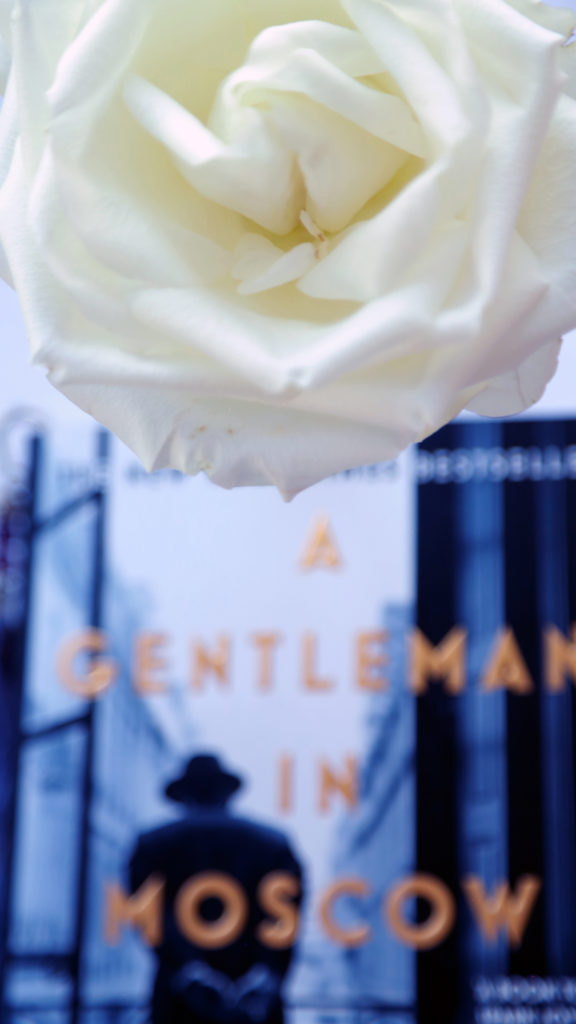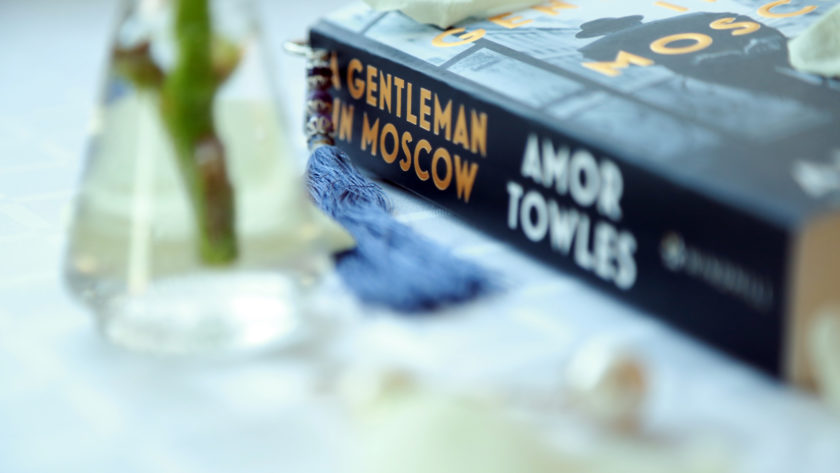Silence can be a form of protest.
It can be a means of survival.
But it can also be a school of poetry—
one with its own meter, tropes, and conventions.
One that needn’t be written with pencils or pens;
but that can be written in the soul with a revolver to the chest.
Amor Towles, A Gentleman in Moscow
I discovered Amor Towels’s “Gentleman in Moscow” during the pandemic, as a book recommended by The Duchess of Cornwall. And for once, I did not hesitate to read a story of Russia. The time spent reading it had a very distinct aroma, that feels very much present, even when the details start to fade. A world I was somewhat familiar with, through my own family’s story on the other side of the Iron Curtain, but that I had the pleasure of discovering from the perspective of an American writer. Join me in a journey of the senses through my review of A gentleman in Moscow. The images of interiors come from the Jacquemart-André Museum in Paris, an inspiration for memories of elegant Russian decor.
The story in one phrase
Count Alexander Rostov lives 32 years of house-arrest in the Metropol Hotel in Moscow, as he puts his noble spirit to the highest test possible : being true to himself in a world intent on crushing him.

Barcarolla
The soundtrack going on in my head while reading was very eclectic. Balalaikas and violins, rhythm and feeling, everything combined depending on the chapter. But the one that held the spotlight front and center was Tchaïkovsky’s Barcarolla. Inspired by the traditional folk song of Venetian gondoliers, the barcarolle was a very popular piece of music in the Romantic period. Its rhythm was reminiscent of the gondoliers stroke, and with a moderate tempo of small and regular waves, it has a very delicate feel. Russia has given many great composers to the world of classical music, but the one that I enjoy the most is without the shadow of a doubt, Tchaïkovski. His exceptional sense of harmony is a testimony of his love for Mozart, and of his highly sensitive nature. It is said that Tchaikovsky’s main concern was how his music impacted his listeners on an aesthetic level, what his listeners experienced on an emotional or visceral level. And his Barcarolla has, in my humble opinion, the vibration of Count Alexander Rostov. An elegant, silky musical texture, a discreet yet unmistakable personality, and the effortless ability to make you dance while standing still.

How does it make me feel
Revolted, in total admiration, intrigued and seduced. The Russian old-world aristocracy and the revolutionary bolcheviks divide and coexist in a story of deep meaning for me. I think the strongest feeling I had was of relief that someone else, on the other side of the world, has the same vision as I have over events that seem to lose their meaning as generations forget, distort or embellish to their advantage.
Impressions
The novel reviews and puts into perspective many basic human values, since they are the first ones to be dislocated during revolutions. One that I hold dearest is the concept and quality of elegance. A word that has suffered many transformations and reinterpretations in the last century or so, and seems to have kept mostly its aesthetic value nowadays.
In a world determined to right the wrongs of discrimination and free every human being from the tyranny of the majority, some moral concepts seem to be confused with censorship and fall as collateral damage in the greater battle for freedom. One such example is my friend, the elegance. Dictionaries are slowly starting to emphasise its “richness of design” definition and forget or place in 4th or 5th place its “dignified gracefulness”. Some more traditionalist French dictionaries still place in first place its broad definition : “quality of someone distinguished by its taste, its choice in clothing, the grace of its manners”.
Were we to conduct a survey on the streets of the greater cities in the world, I believe most people would associate elegance with aesthetically pleasing things, mostly fashion related. And in doing so, they would automatically put any elegant person in the wealthy category. This has created gaps in society, and it has partly pushed people towards the exact opposite, in an attempt to affirm their value despite their lack of means.
As you can see, I am very fond of elegance, and I found my joy in the following quote :
The Count took pride in wearing a well-tailored jacket; but he took greater pride in knowing that a gentleman’s presence was best announced by his bearing, his remarks, and his manners. Not by the cut of his coat.

Russian Tea
Many years ago, while binging on a famous TV-series, a guest appearance of Mikhail Baryshnikov has forever changed my view of Russian tea. The simple yet unusual phrase “we sweeten our tea with black cherries” had stayed with me long after, though I never tried it before reading the novel. The perfect opportunity to indulge in a St Petersburg blend of Chinese black tea infused with aromas of red fruit, bergamot and caramel, but traditionally, a simple black tea would suffice. The shiny cherries look like precious gemstones, ready to transform a classic cup of tea into a Russian experience. And a delicious one, I promise. There is a perfect balance between the sweet sourness of the cherries and the deep black tea flavour, you cannot compare it with any other tea. Stirring it, I feel like I’m bringing to life all the characters in the novel around my table.
My favourite character
It seems too easy to choose The Count as my favourite of all the characters, but I cannot turn away from the embodiment of so many values I regard so highly. If elegance is already covered, maybe the second thing I most appreciate in him is the power to adapt. Or dare I say, the intelligence to adapt without betraying himself in the process. There is a wonderful phrase in the book that says “if a man does not master his circumstances then he is bound to be mastered by them.” And this got me thinking to a very obvious parallel between The Count’s house arrest and the lockdowns imposed all over the world by the recent pandemic. You could argue that our circumstances were impossible to master, since they were imposed upon us by figures of authority. Yet there is one thing that no pandemic, no political regime, and no revolution have managed to control or censure : our inner world. Count Rostov’s story is the perfect example that spirits can be crushed only if they are ignored by their own master, but also that a strong spirit does not equal a strong head, a big mouth or a tough fist.
Favourite Quote
He had said that our lives are steered by uncertainties, many of which are disruptive or even daunting; but that if we persevere and remain generous of heart, we may be granted a moment of lucidity—a moment in which all that has happened to us suddenly comes into focus as a necessary course of events, even as we find ourselves on the threshold of the life we had been meant to lead all along.

White Roses
I hear Tchaïkovsky in the background, I taste the black cherries on the tip of my tongue, but what do I smell ? Researching the Romanovs is a never ending adventure, and one that deserves my time and attention. But for now, I am most interested in Alexandra Feodorova, the last Empress of Russia, and her preference when it comes to fragrance. Since French was the language most used at the Russian Court, I was expecting to find a famous Guerlain or Caron as her favourite. But seeing that she did not speak French when she got married to the Tsar, and that she struggled with it until the end, her choice of an English brand seems more natural.
In the writings of Lili Dehn, a close friend of the Empress, I found the answer to my question :
Apropos of her fondness for lilac and lilies of the valley, I may mention that the Empress loved all flowers, her especial favourites being lilies, magnolias, wistaria, rhododendrons, freesias and violets. A love of flowers is usually akin to a love of perfumes, and the Empress was no exception to the rule. She generally used Atkinson’s White Rose; it was, she said, “clean” as a perfume, and “infinitely sweet” – as an eau-de-toilette.
The perfume was created in 1860, but is no longer produced in its original form, that was said to have powdered notes of white rose and a touch of bergamot on a canvas of white musk. My olfactory curiosity is now satisfied, and my immersion into the Russian universe I’m compiling is a success.

Life Lesson
So many life lessons converging to a common place. The fact that being noble does not reside in material possessions, and ultimately not even in a title or the family you are born in. It is a constant exercise in good thoughts, good deeds and good words. A profound persuasion that treating others with respect is the first proof of respecting yourself. And a never ending pursuit of living a life of purpose and contentment.
Why you should read it
History is subjective, so I have no expectation of accuracy from historical fiction. However, keeping in mind that there is no absolute truth in any situation, the novel has impressive historical value, not only in facts but mostly in psychological profiles of the time. So that’s one reason to read it. But if you’re more interested in the story than the hi-story, I think “A gentleman in Moscow” could surprise you in a different way. Taking a step back from our concerns is always easier said than done. But maybe, while reading this novel, your perspective of hardship will change, and if you’re lucky, the spark of inspiration to find joy no matter the context will start to glow.
Latvian Stew
…the onions thoroughly caramelized, the pork slowly braised, and the apricots briefly stewed, the three ingredients came together in a sweet and smoky medley that simultaneously suggested the comfort of a snowed-in tavern and the jangle of a Gypsy tambourine.
All readers of the novel surely remember an episode around page 95 involving a young couple, a Latvian stew and a bottle of Georgian wine. It is impossible to resist the urge of finding the recipe and getting to work. Since the book was first published in 2016, I was lucky enough to find plenty of ressources online. Even the original recipe of Amor Towles.
I ended up combining several recipes I found online and adding a personal twist, so I’ll leave the details for the full recipe HERE. What I can tell you is that it turned out better than I could have imagined. A classic stew at first sight, it reveals a depth of aromas with every new bite. The subtle sweetness of the dried apricots and the tanginess of the prunes are like a harmonious undertone in a painting that honours the main character : melt-in-your-mouth pork. You could serve it with some mash potatoes or simply boiled with some olive oil and parsley, but I went for the simple version of fresh bread.
I’m sorry for the vegetarians… well, in fact, I’m not sorry, it was too delicious to regret anything about it. But I’ll make it up to you next week, promise.

Thank you for joining my Russian inspired ritual. This is how I read. Engaging my senses, freeing my imagination, immersing myself in a story, and in the end, feeling like I have lived a whole life, and a different one, in just a few days. I would love to hear your thoughts on the book, visit me on social media and we’ll continue the story.
Until next time, enjoy your reading, and your rituals !
If you would like to support The Ritual of Reading, please consider purchasing your books from the Bookshop.org dedicated site by clicking the link below. You get to support local bookstores and I make a small commission with every purchase. Thank you !




